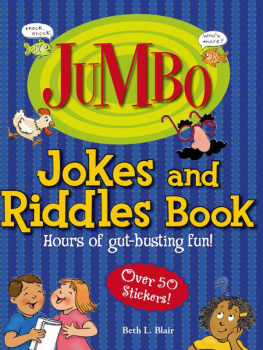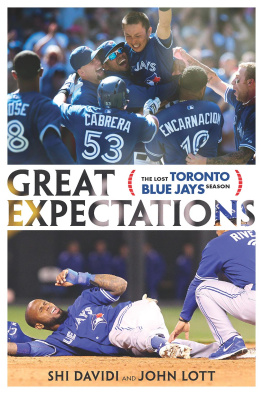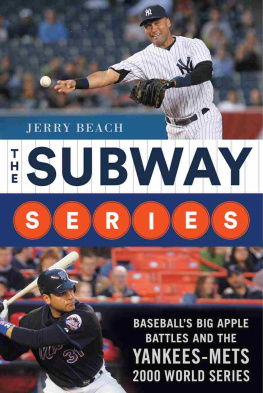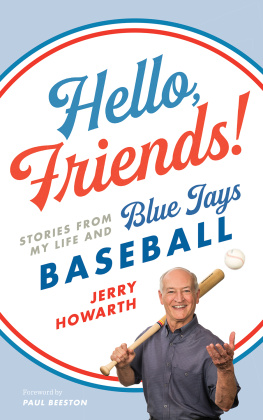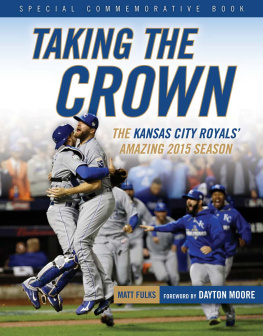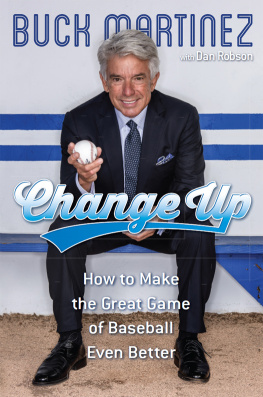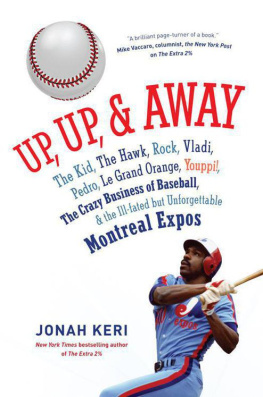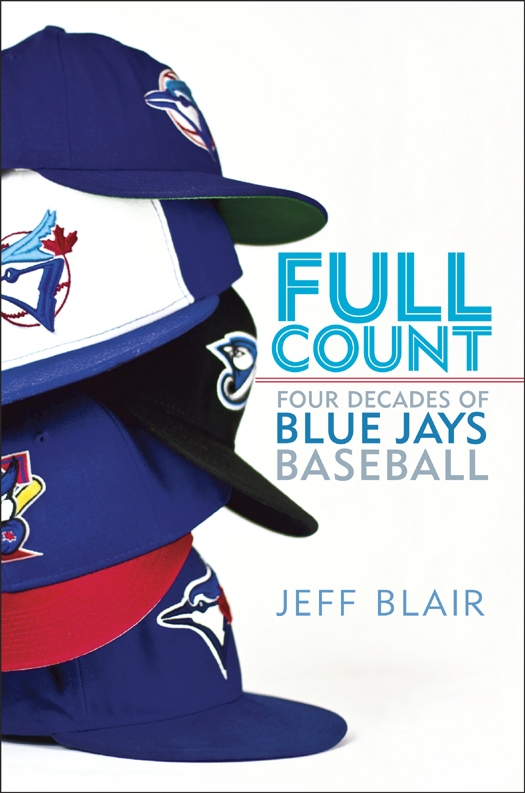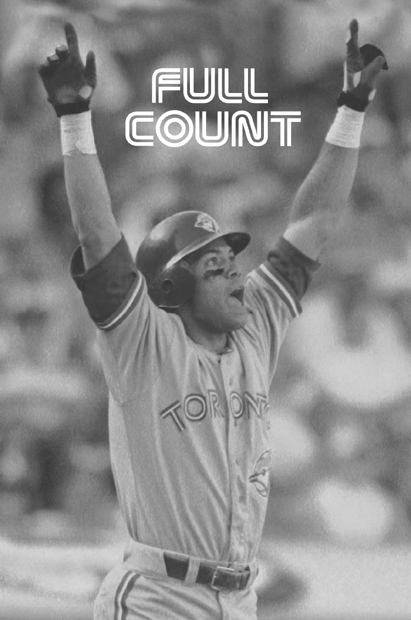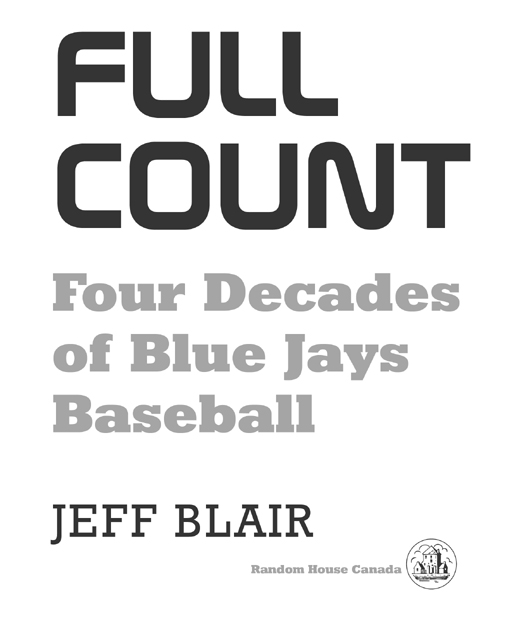PUBLISHED BY RANDOM HOUSE CANADA
Copyright 2013 William Jeffrey Blair
All rights reserved under International and Pan-American Copyright Conventions. No part of this book may be reproduced in any form or by any electronic or mechanical means, including information storage and retrieval systems, without permission in writing from the publisher, except by a reviewer, who may quote brief passages in a review. Published in 2013 by Random House Canada, a division of Random House of Canada Limited, Toronto. Distributed in Canada by Random House of Canada Limited.
www.randomhouse.ca
Random House Canada and colophon are registered trademarks.
Library and Archives Canada Cataloguing in Publication
Blair, Jeff
Full count : four decades of Blue Jays baseball / Jeff Blair.
eISBN: 978-0-345-81255-1
1. Toronto Blue Jays (Baseball team)History. I. Title.
GV875.T6B53 2013 796.3576409713541 C2013-900613-3
Cover design by Andrew Roberts
Cover image: Hats from the collection of Garrett Gaulberto; photograph by Andrew Roberts
Interior images: Roberto Alomar, photo by CHRIS WILKINS/AFP/Getty Images
Joe Carter, photo by JEFF HAYNES/AFP/Getty Images
v3.1
To family, for their understanding and support
To Hal Sigurdson, for being the first to believe
CONTENTS
INTRODUCTION
HOW TO EXPLAIN THE 2012 SEASON TO CANADIAN baseball fans? Has there ever been one that tried your soul as much? That made you wonder if the baseball gods had it in for you? In Toronto, the promise of a young, go-go team and the return of a popular logo and jersey energized a once-dormant fan base and put a charge into television ratings across the country. Third baseman Brett Lawrie was one of the biggest stories in Canadian sports. He was one of our own, this tattooed, hyperkinetic bundle of muscle, playing for us on our own soil. And the names he evoked! My goodness. Pete Rose? George Brett? A bit of both?
But the promise of the best spring training record in the majors was no more than a faded memory by the All-Star break, the result of too many pitching injuries, and injuries to key players, including Jose Bautista. As the schedule wore on, the club tumbled into last place and took on an air of dysfunction. A two-week period near the end of the season seemed to put everything in context. In mid-September, the club handed shortstop Yunel Escobar a three-game suspension after pictures popped up on-line, showing him on the field during a game with a homophobic slur written on his eye-black tape. Not long after, future Hall of Famer Omar Vizquel, an otherwise benign presence while taking an end-of-career victory lap with the team, skewered John Farrell and his coaching staff for a clubhouse culture that lacked accountability and for an overall sloppy approach to the game.
The clubhouse implosion and disappointing end to a season that had begun with such promise were capped off by the defection of manager John Farrell to the Boston Red Sox. Farrells departure was just baseball business, a perfect storm of circumstances, in the words of Toronto Blue Jays general manager Alex Anthopoulos. But it was taken as a slap in the face, as evidence of the team and its fans getting short shrift. All in all, it was some way to celebrate the 20th anniversary of the Jays first World Series titlebut then the organization itself never bothered to celebrate its 1992 team in any ceremony. In retrospect, it might have seemed like marketing prescience. The truth?
As an organization, I think there was a sense that we lived too much in the past, said Blue Jays president and chief executive officer Paul Beeston a little more than 24 hours after Farrells exit had been formalized. You could see people feeling that way. We talked about doing something about the anniversary. But there really was a sense we had to move on.
It could have been worse. The Washington Nationals could have gone on to the World Series, something they never managed to do as the Montreal Expos. While that city has torched whatever ties it had to the team, there is little doubt that old wounds would have been reopened, for a number of reasons. First, the man who helped expedite the Expos departure from Montreal, Miami Marlins owner Jeffrey Loria, finally got his new ballpark in Miamiin time for Opening Day 2012 and just weeks after Gary Carter, the first player to go into the baseball Hall of Fame with an Expos cap on his plaque, passed away from a particularly vicious form of brain cancer. Baseball fans with sympathies leaning toward the Expos looked on with mixed feelings as the Nationals turned into the best story in the game, clinching their playoff spot at a canter and doing so with a combination of precociousnessteenager Bryce Harper, electric-armed pitcher Stephen Strasburgand an incredible sense of self.
The club rolled to a 9864 record, the best in the majors, before losing to the St. Louis Cardinals in the deciding game of the best-of-five National League Division Series in cruel fashion, but the Nationals sudden exit didnt detract from the perception that everybody involved with the Expos had received some kind of return. Loria got his, winning the 2003 World Series with an improbable team and beating his childhood team, the New York Yankees. John Henry got his, owning the Boston Red Sox when they finally ended the 86-year-old Curse of the Bambino by winning the World Series in 2004, in the process establishing the hugely successful New England Sports Networkas well as purchasing Barclays Premier League soccer club Liverpool through his New England Sports Ventures. Meanwhile, commissioner Bud Selig got to keep all the politicians happy and add another star to his legacy by shepherding the game back to the nations capital.
But what about Canada? Even leaving the Montreal mess aside, the story of baseball in this country has been at best mixed since Joe Carter touched em all in 1993. Triple-A franchises in Ottawa, Calgary and Edmonton have disappearedthe only remaining affiliated minor league franchise in the country is the Vancouver Canadians, the Blue Jays short-season Single-A affiliate in the Northwest Leagueand in their place independent league teams in Winnipeg and Quebec City have established themselves in niche markets. The Canadian Baseball League was founded in 2003. It died that year too. At least 70 Canadian cities and towns have been the home of minor league baseball teams down through the years, with the high-water mark coming in 1913, when no less than 24 towns and cities had minor league baseball. We are nowhere near the high-water mark now. Not even close.
The Blue Jays did not escape damage from the 1994 players strike, even though the impact in Toronto did not seem as immediately profound as it appeared to be in Montreal. Attendance began a slow, steady decline as the club settled into a kind of middle-class hell. Once the biggest spenders in the game, the Blue Jays saw American League East rivals the New York Yankees and the Boston Red Sox dwarf their payroll. At the same time, the sale of the teams owner, John Labatt Limited, to Interbrew SA, a soulless Belgian-based brewery with no interest in a sports franchise, started to soften the strong leadership structure that had made the Blue Jays the Cadillac of franchises. The inevitable player exodus was followed by an exodus of management, including general manager Pat Gillick and president Paul Beeston. The SkyDome became an empty shell on many nights, and the sense that the team was spinning its wheels grew. Attendance, which had peaked at 4,057,947 in 1993, fell below 3,000,000 in 1995. By 2002 it was down to 1,637,900.


